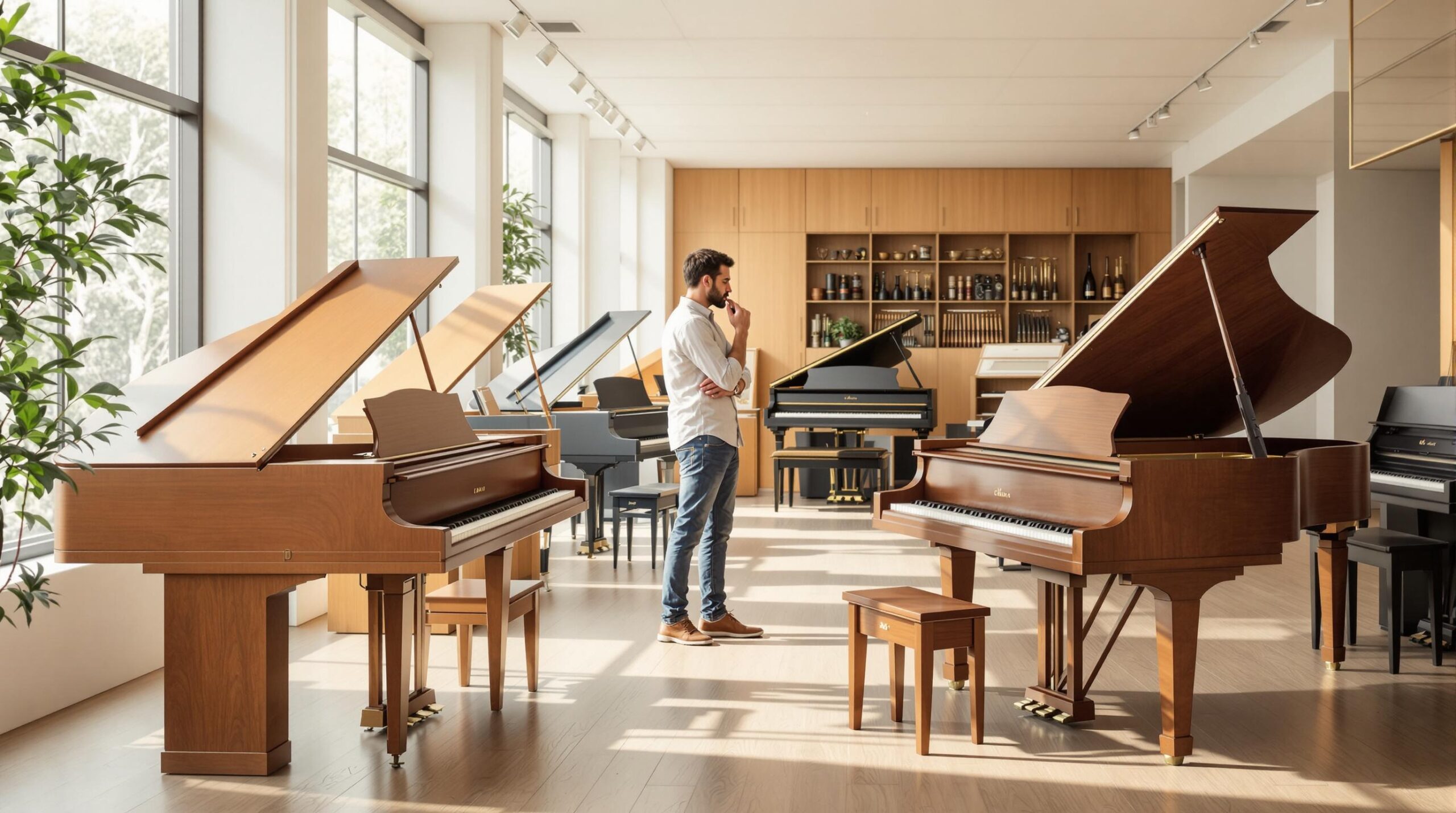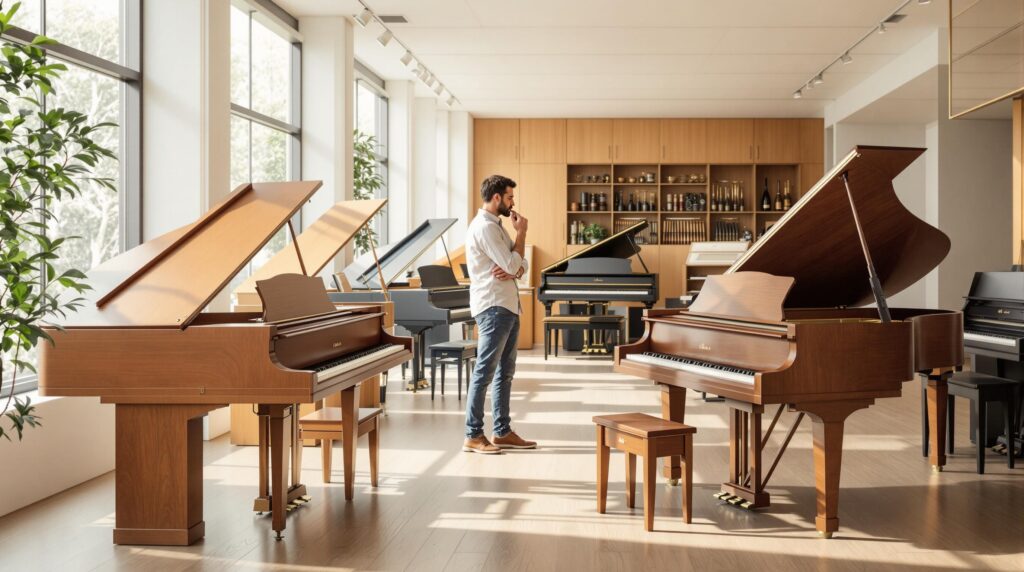
Buying a piano is a big decision. Whether you’re a beginner or an experienced player, asking the right questions can help you choose the perfect instrument. Here’s what to consider:
- Skill Level: Are you a beginner or a professional? Different pianos suit different playing levels.
- Budget: Acoustic pianos range from $3,000 to over $200,000. Factor in costs like tuning, maintenance, and delivery.
- Space: Measure your room and check if the piano fits. Uprights need less space, while grand pianos require larger areas.
- New vs. Used: New pianos come with warranties. Used pianos can save money but need careful inspection.
- Sound and Feel: Test the piano’s tone, touch, and sustain to ensure it matches your preferences.
- Maintenance: Plan for regular tuning and humidity control to keep the piano in good shape.
- Delivery and Setup: Check for fees, insurance, and any challenges with access or stairs.
Quick Tip: Visit a piano showroom to try different models and get expert advice. Always ask about warranties, financing options, and additional services like moving or tuning. A little preparation goes a long way in finding the right piano for your needs.
Piano Buyer’s Guide | Find The Right Piano For You
Know What You Need
Before diving into quality and maintenance, start by identifying your specific needs.
Your Playing Level
Your experience and musical goals play a big role in choosing the right piano. For beginners, an entry-level upright piano might work perfectly. More advanced players may prefer instruments with refined action mechanisms and richer tones.
Ask yourself:
- How long have you been playing?
- Are you aiming for professional training or performances?
- What kind of music do you usually play?
- Will others in your household with varying skill levels also use the piano?
Your Price Range
Setting a clear budget helps narrow your options and ensures you get the most for your money. New acoustic pianos can cost anywhere from $3,000 to over $200,000, depending on size, brand, and features.
Think about:
- The upfront cost
- Monthly payment plans
- Insurance needs
- Yearly maintenance costs
- Long-term resale value
Once you’ve set a budget, make sure the piano fits comfortably in your space.
Your Available Space
Here are typical dimensions for common piano types:
| Piano Type | Width | Depth | Height | Minimum Room Space |
|---|---|---|---|---|
| Upright | 58" | 24" | 48" | 5′ x 7′ |
| Baby Grand | 58" | 5’6" | 40" | 8′ x 9′ |
| Grand | 62" | 6’8" | 40" | 9′ x 12′ |
When planning your space, keep these factors in mind:
- Can your floor handle the piano’s weight?
- Is the room temperature and humidity stable?
- Will the piano fit through doorways or up stairs during delivery?
- Is there enough room for the bench and music stand?
Check Piano Quality
New vs. Used
When deciding between a new or used piano, it’s important to weigh the benefits of each. New pianos come in perfect condition and include manufacturer warranties. Used pianos, on the other hand, can save you money if they’ve been properly cared for.
Questions to ask about used pianos:
- When was it made, and who owned it before?
- Are there maintenance records, and how often was it tuned?
- Do the hammers or strings show any wear?
- Has it undergone any repairs or restorations?
- How stable is its current tuning?
For new pianos, ask about:
- Break-in period requirements
- The schedule for initial tunings
- What the factory warranty covers
- The lifespan of key components
- Any included maintenance services
Make and Model
Once the condition is clear, dig into the brand and model specifics. Different manufacturers offer unique sound profiles, touch responses, and build details.
"At Cooper Piano we pride ourselves on the quality of our products" – Cooper Piano
Questions to consider about make and model:
- What sets this brand’s construction apart?
- How long has this model been in production?
- What materials are used for the soundboard and strings?
- Are replacement parts easy to find?
- How long is this model expected to last?
Sound and Feel
| Aspect to Test | What to Check | Why It Matters |
|---|---|---|
| Touch Response | Key weight and how quickly keys return | Impacts playing control and technique |
| Tone Quality | Balance across bass, middle, and treble | Ensures consistent sound throughout the keyboard |
| Sustain | How long notes last and fade | Crucial for expressive playing |
| Action Noise | Mechanical sounds during play | May point to wear or needed repairs |
| Dynamic Range | Ability to play softly and loudly | Vital for musical expression |
When testing a piano, try the following:
- Play familiar pieces to explore its dynamic range.
- Test individual notes and chords across the keyboard.
- Listen for a consistent tone from key to key.
- Check how the pedals respond and if they make noise.
- Evaluate the sound both up close and from a distance.
After this, explore care and maintenance options to ensure your piano remains in top shape.
sbb-itb-b8bc1ab
Care and Coverage
Regular Maintenance
Taking care of your piano is crucial for its longevity and performance. Here are some key questions to help you understand its upkeep:
- Tuning Schedule: How often should this model be tuned?
- Humidity Control: What’s the best way to manage humidity around the piano?
- Cleaning Guidelines: What are the recommended cleaning and care routines?
- Maintenance Packages: Are there any service packages available?
Stick to a regular tuning schedule and keep an eye on humidity levels to ensure your piano stays in top condition.
Warranty Information
Before buying, make sure you understand the warranty details. Ask questions like:
- Coverage: Which parts of the piano are included under the warranty?
- Duration: How long does the warranty last?
- Conditions: Are there specific actions that could void the warranty?
- Transferability: Can the warranty be transferred if you sell the piano?
- Claims: What documentation is needed to file a warranty claim?
Knowing these details upfront can save you from unexpected costs down the road.
Service Support
Cooper Piano is known for its reliable and customer-focused service support. Here’s what one satisfied customer had to say:
"These guys (and gals) are true professionals. Had a baby grand I needed moved which had lots of sentimental value. There was never a doubt that Cooper Piano was going to be able to move and set up the piano at its new home in the same condition it left its previous home. Highly recommend." – Barrett E. Lowery [1]
When evaluating service support, consider these important questions:
- Technician Availability: How quickly can a technician be scheduled?
- Parts Access: Are replacement parts readily available?
- Emergency Repairs: Is emergency repair service offered?
- Moving Services: What specialized moving services are provided?
- Cost: Are there service plans or packages to manage costs?
Additionally, ask about:
- The qualifications of the technicians
- Response times for service requests
- The geographic area covered for service
- Loaner instruments during repairs
- Post-service follow-up procedures
Understanding these aspects ensures you’re fully prepared for any service needs. Don’t forget to review any extra fees or additional services before finalizing your purchase.
Extra Costs and Services
After evaluating the quality and condition of a piano, it’s important to consider additional costs and purchase options.
Delivery and Setup Fees
When arranging delivery, make sure to inquire about:
- Delivery Charges: What is the base fee, and does it vary by distance?
- Setup Costs: Does the price include assembly and initial placement?
- Stair Fees: Are there extra charges for stairs or challenging access points?
- Insurance Coverage: Is the piano insured during transport?
- Timing: What are the requirements for scheduling delivery?
Support Services
Cooper Piano provides a range of support services. Be sure to ask about:
- Tuning Services: The current tuning fee is $200 per session.
- Service Packages: Are there maintenance plans available?
- Restoration Options: Do they offer services for older pianos?
- Appraisal Services: What are the fees for piano appraisals?
- Lesson Programs: What lesson programs are offered, and what are the rates?
For example, one customer shared their experience:
"Brent Wood does a great job. Happy with his work. Not happy with the price increase to $200. I will be having my piano tuned every other year in the future. Just can’t afford it as a senior on Social Security." – Rosemary Rendek [1]
Purchase Options
When exploring purchase options, consider asking about:
- Financing Plans: What financing options are available?
- Rental Programs: Are there rental-to-purchase credit options?
- Trade-In Value: Do they offer a trade-in program?
- Trial Period: What are the terms of their satisfaction guarantee?
- Payment Methods: What types of payment are accepted?
Next Steps
You’ve got the basics about pianos – now it’s time to make your move. Stop by Cooper Piano’s showroom to explore a carefully selected range of instruments and get expert advice tailored to your preferences.
Here’s what one satisfied customer had to say:
"You will not find a better dealer… You will receive a fair and accurate appraisal of your piano if you are a seller. You will receive a fair trade if you want to modernize or upgrade your piano. If you buy a piano from Cooper, you can be confident that you are getting the best value for your money, and you are getting the best music for your family!" [1]
Before You Visit
- Schedule an appointment: The showroom is open Monday–Saturday (10 AM – 6 PM) and Sunday (1 PM – 5 PM).
- Prepare your questions: Think about piano models, features, and services you want to know more about.
- Take your time: Plan enough time to try out different pianos and make an informed decision.
Cooper Piano doesn’t just help you find the right piano – they offer ongoing support to keep it in top shape. From moving and tuning to regular maintenance, they’ve got you covered. Visit their showroom at 1610 Northeast Expy NE, Atlanta, GA 30329-2003 or call 404-329-1663 to set up your appointment.

